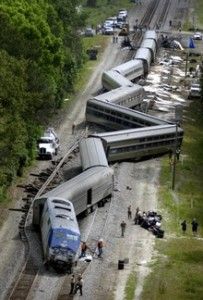Top officials live up (down?) to bullet train tradition
June 10, 2013
By Chris Reed
 When the Los Angeles Times broke the story in April that the California High-Speed Rail Authority had quietly changed the rules to de-emphasize the importance of technical competence among bidders for the first segment of the bullet train, new authority CEO Jeff Morales and board Chairman Dan Richard pushed back as hard as they could.
When the Los Angeles Times broke the story in April that the California High-Speed Rail Authority had quietly changed the rules to de-emphasize the importance of technical competence among bidders for the first segment of the bullet train, new authority CEO Jeff Morales and board Chairman Dan Richard pushed back as hard as they could.
It was a huge story by any standard. Given the engineering challenges posed by the bullet train, the initial decision that only the three bidders judged the most skilled at engineering and project management be eligible made absolute sense. We’re not talking about building, oh, a bridge. We’re talking about building a super-fast train on sometimes difficult terrain.
But Morales and Richard insulted the LAT’s coverage, trashed a subsequent editorial that I wrote and pretended to hold the high ground, asserting the flap was much ado about nothing.
Why rail authority’s hardball flopped
It didn’t work. Most coverage last week of the authority’s decision to award the $985 million contract for construction of the initial 29-mile segment in the Central Valley to the Tutor Perini consortium highlighted the fact that Tutor Perini was judged the least qualified of the five bidders, but won out because it was the cheapest.
As I noted in a Sunday follow-up editorial, the problem with this approach is that Morales and Richard …
” … have never given a persuasive explanation as to why the decision was made to de-emphasize engineering and project management competence without a public hearing and board approval. … Instead, they’ve launched a public-relations offensive, including a complaint about a critical U-T San Diego editorial that the authority said ignored the ‘careful and transparent development of its bidding process.’
“This claim would only be true if the authority had held a public hearing on the rule change. As such, it isn’t spin. It is myth.”
‘Careful and transparent’: Classic rail authority buncombe
As the editorial notes, this approach was no surprise. It’s what the rail authority does:
“The November 2008 proposition authorizing $9.95 billion in state bond funds for the project was sold to voters with grossly false claims about the project’s long-term cost, ridership and job creation. Voters were also told it was likely to win tens of billions of dollars from private investors — even though rail authority officials knew such investment would require ridership or revenue guarantees they couldn’t legally provide.
“The saga of Tutor Perini thus amounts to one more pathetic chapter in California’s bullet-train follies.”
Bullet-train beat reporters reject spin
And that’s how it was treated by the reporters who have done an increasingly good job covering the follies of the CHSRA laughed off the criticism. Consider this delicious lede by San Jose Mercury-News reporter Mike Rosenberg:
“SACRAMENTO — State bullet train leaders on Thursday approved the start of construction for California’s $69 billion high-speed rail line, choosing the cheapest but least qualified firm to build the first leg.”
“Cheapest but least qualified”! How reassuring!
I look forward to Morales’ and Richard’s next round of faux indignation over the coverage of the fiasco they are shepherding.
Related Articles
Maldo Goes Immigrant Bashing
Anthony Pignataro: The Abel Maldonado for Lieutenant Governor camp recently put out a new radio ad attacking San Francisco Mayor
Filner accuser heads San Diego school system
The Associated Press and the state media have done a good job on San Diego Mayor Bob Filner’s pathetic sexual-harassment
Yes! Split California in Two
John Seiler: Riverside County Supervisor Jeff Stone advocates something I long have backed: Split California in two. Let Gov. Jerry




